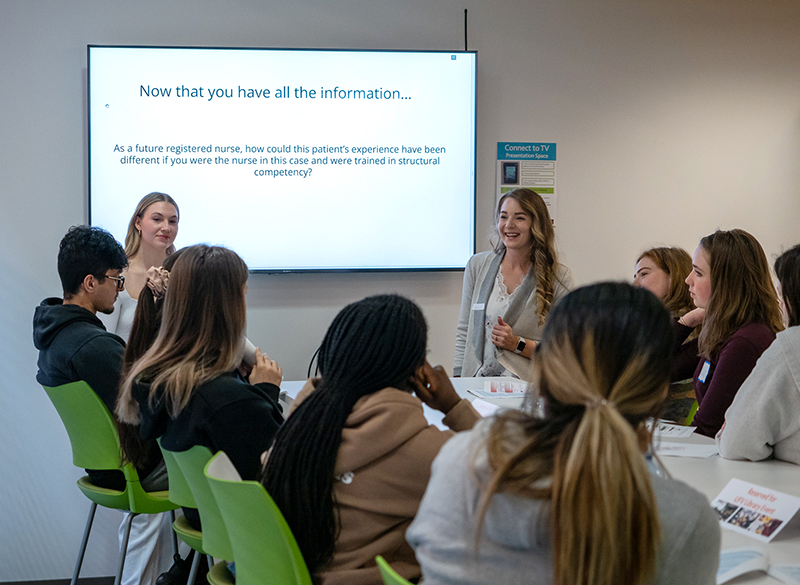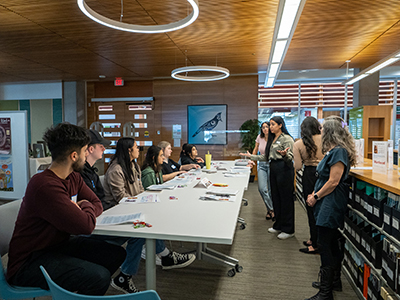Sociology and nursing students work together to examine social determinants of health

When it comes to health issues, a person’s postal code can have as much or more influence than their genetic code.
Inequities, including lack of access to resources, and discrimination based on race, gender, and economic status an all affect how a person interacts with the health-care system.
A recent interdisciplinary project at UFV saw upper-level sociology students lead first-year nursing students through a morning workshop that allowed them to explore and develop structural competency, defined as the ability of health care providers and trainees to appreciate how symptoms, clinical problems, and attitudes toward patients and health systems are influenced by ‘upstream’ social determinants of health.
“When certain patients are referred to as ‘frequent flyers’ in the emergency ward we need to ask why,” notes Dr. Michael Corman, an associate professor of sociology at UFV with a research interest in medical sociology. “Society is structured in such a way that certain types of people seek health care more frequently than others.”

Corman taught a special topics sociology class this semester that involved having his students learn about structural competency, health professional education, and the social determinants of health, and then work together in groups to teach the concepts to first-year nursing students during a special crossover session.
Social determinants of health are defined as social and economic factors that influence differences in health status. They include health-promoting factors, such as decent living and working conditions, or the lack of the same.
“The social determinants of health a have a significant impact on nursing practice and outcomes,” said one the sociology students during the introduction to the workshop. “Access to healthy food, financial security, and housing, as well as economic status, environmental factors, education, age, gender, race, and the state of the health-care system are all factors. Inequality can be worse for your health than smoking.”
Each team of sociology students developed case studies of clinical encounters for discussion and reflection, and also allowed time for the groups of nursing students to discuss approaches to taking care of their own mental health.
The morning started with an opening session where sociology students used memes and a Kahoot quiz to introduce the concepts, then two break-out sessions facilitated by the sociology students, and then the whole group gathered again for reflection.
Catherine Liao, associate professor in the Nursing program who agreed to have her class cooperate with the sociology students, said it was a good opportunity for her students to examine their approach to practice from a wider perspective.
“Rather tell patients that they should eat healthy food, they will learn to ask ‘what can we do to help you eat in a healthier way?’ And instead of thinking, ‘Oh, you again’ when a repeat patient shows up in the ER, they’ll ask ‘What can I do to help you so you won’t need to come back?’”
Sociology student Lisa Halliday appreciated the opportunity to take a deep dive into the concepts of structural competency and social determinants of health, and of thinking of ways, including using memes as teaching aides, to help the nursing students absorb the concepts.
“With our professor’s enthusiasm and passion, and our understanding that the system isn’t always as good as it could be, we were able to create material to teach others,” she said.
Catherine Fahim and Dawn Nansumba are nursing students who took part in the exercise.
“It helped encourage us to think about health care situations within a broader context,” said Fahim. “There are many factors that can influence how someone is feeling in addition to biology. And other peoples’ biases have an impact on health outcomes.”
Nansumba concurred.
“We should be thinking about ‘upstream’ issues and discuss them more often in the healthcare setting. This really reinforced what we have been learning in class.”
At the conclusion of the session, sociology student Isaac Gregson encouraged the nursing students to remain committed to their chosen field.
“I hope nothing we’ve discussed today will discourage you from becoming a nurse. Now more than ever we need people who approach it with passion and do it well. After today, when we’ve shared ways to approach solutions to structural problems, you have a sociological toolkit to bring with you into your nursing career.”
In addition to Corman and Liao collaborating across disciplines by having their sociology and nursing students work together, the project also had input from Claire Hay, a specialist with the TEaching and Learning Centre at UFV.
“Without the expert support from Claire Hay the innovative design of the course that culminated in this workshop would not have been possible,” said Corman. “So, this workshop was truly a collaborative and interdisciplinary endeavour.”





